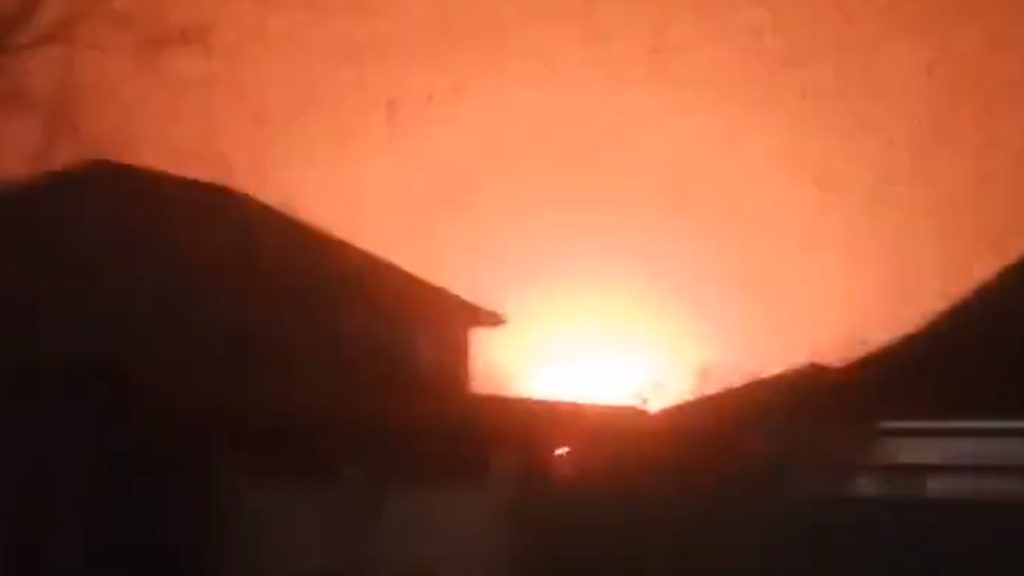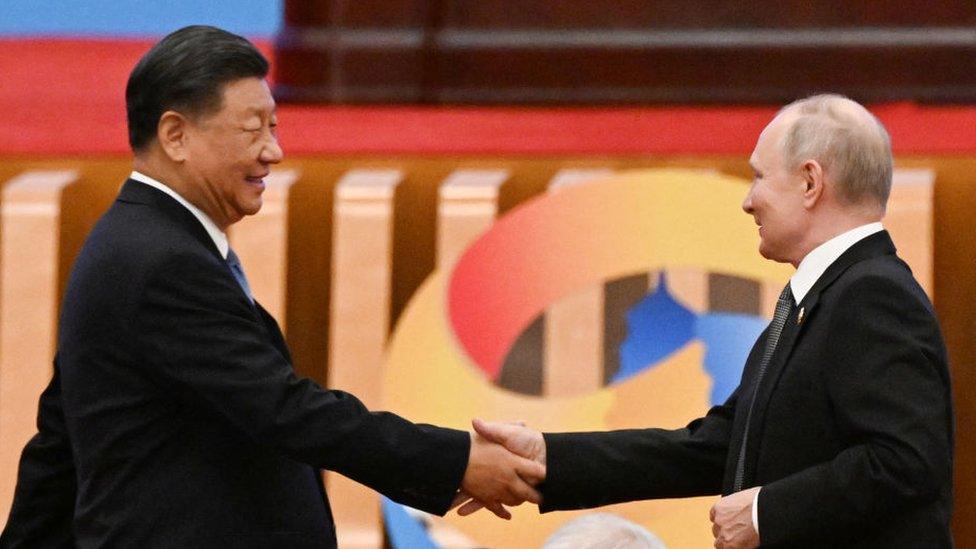Putin: China plan could end war, but Ukraine and West not ready for peace
- Published
Watch: Putin and Xi's 'Dear friendship'... in 62 seconds
China's peace plan for Ukraine could be used as a basis to end the war, Vladimir Putin has said.
But Mr Putin said the plan could be put forward only when they are ready "in the West and Kyiv".
The Russian leader met Chinese President Xi Jinping on Tuesday in Moscow to discuss the conflict, and relations between the two countries.
China's plan, published last month, does not explicitly call for Russia to leave Ukraine.
Listing 12 points, external, it calls for peace talks and respect for national sovereignty, without specific proposals.
But Ukraine has insisted on Russia withdrawing from its territory as a condition for any talks - and there is no sign that Russia is ready to do that.
On Wednesday the Moscow-backed authorities in annexed Crimea said an attack by three waterborne drones on the Black Sea Fleet in the Bay of Sevastopol had been repelled with no damage to the fleet. The report could not be independently confirmed.
On Monday, explosions in another part of Crimea were said by Ukraine to have destroyed Russian missiles being transported by rail.
The US Secretary of State Antony Blinken said on Monday that calling for a ceasefire before Russia withdrew "would effectively be supporting the ratification of Russian conquest".
In a joint news conference after talks with Mr Xi ended, Mr Putin said: "Many provisions of the Chinese peace plan can be taken as the basis for settling of the conflict in Ukraine, whenever the West and Kyiv are ready for it."
But Russia had yet to see such "readiness" from the other side, he added.
Standing alongside the Russian leader, Mr Xi said his government was in favour of peace and dialogue and that China was on the "right side of history".
He again claimed that China had an "impartial position" on the conflict in Ukraine, seeking to cast Beijing as the potential peace-maker.
The pair also discussed growing trade, energy and political ties between the two nations.
"China is the leading foreign trade partner of Russia," President Putin said, pledging to keep up and surpass the "high level" of trade achieved last year.
Mr Xi left Russia on Wednesday, his plane departing from a Moscow airport.
China 'not impartial in any way', White House says
Earlier, Mr Xi called China and Russia "great neighbouring powers and comprehensive strategic partners".
According to Russian state media, the two leaders also:
Signed two joint documents - one detailing plans for economic co-operation and one on plans to deepen the Russia-China partnership
Reached an agreement on a planned pipeline in Siberia to deliver Russian gas to China via Mongolia
Agreed that nuclear war "must never be unleashed"
Discussed their concern at the new Aukus pact - a defence agreement between Australia, the UK and US
Expressed concern over Nato's growing presence in Asia on "military and security issues"
There are growing concerns in the West that China might provide military support for Russia.
Speaking in Brussels, Nato chief Jens Stoltenberg said his alliance had not "seen any proof that China is delivering lethal weapons to Russia".
But he added there were "signs" that Russia had requested weapons, and that the request was being considered in Beijing.
A joint statement released by China and Russia after the meeting between the two leaders said the close partnership between the two countries did not constitute a "military-political alliance".
Relations "do not constitute a bloc, do not have a confrontational nature and are not directed against third countries", they added.
Mr Putin also used the press conference to accuse the West of deploying weapons with a "nuclear component" and said Russia would be "forced to react" if the UK sent shells made with depleted uranium to Ukraine. .
The UK's Ministry of Defence said depleted uranium was a "standard component" which had "nothing to do with nuclear weapons".
Mr Xi was given a fanfare welcome when he arrived at the Kremlin for a second day of talks on Tuesday.
He said he was "very happy" to be in Moscow and described talks with President Putin as "frank, open and friendly".
His visit to Russia came days after the International Criminal Court issued an arrest warrant for President Putin on war crimes allegations.
The state visit was mirrored by Japan Prime Minister Fumio Kishida's surprise visit to Kyiv - making him the first leader of Japan to visit a country in conflict since World War Two.
President Zelensky said he will join the G7 summit in Japan in May via video link at the invitation of Mr Kishida.
He told a press conference on Tuesday afternoon that he had also asked China to get involved in talks but was waiting for an answer.
"We offered China to become a partner in the implementation of the peace formula," he said. "We invite you to the dialogue; we are waiting for your answer."
Related topics
- Published21 March 2023

- Published17 May 2024
